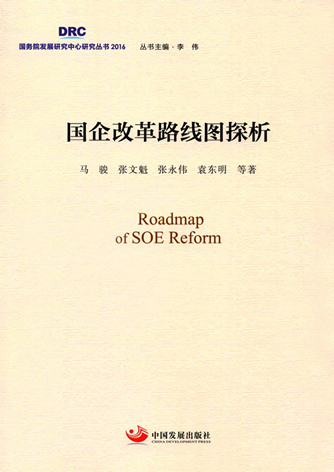Roadmap for State-owned Enterprise Reform
Nov 15,2018

By Ma Jun, Zhang Wenkui, Zhang Yongwei, Yuan Dongming, etc., DRC
2016-12-30
This book is one of the “2016 Research Series by the Development Research Center of the State Council” and also an important research result of DRC in 2015. State-owned enterprise reform is an important component of China’s economic system reform. This book puts forward policy options for state-owned enterprise reform from the perspective of system and mechanism based on numerous enterprise surveys and discussions with experts, and also suggests targeted policy options on how to deal with the challenges from the articles on state-owned enterprises in the TPP agreement.
This book consists of 19 chapters. The first chapter is about the performance of state-owned enterprises. The second chapter is about several important issues in deepening the reform of state-owned enterprises. The third chapter is about further promoting the employee stock ownership in state-owned enterprises. The fourth chapter is about further strengthening the construction of state-owned enterprises’ board of directors. The fifth chapter is about policy options on deepening the reform of three mechanisms in state-owned enterprises. The sixth chapter concerns establishing the information disclosure system in state-owned enterprises. The seventh chapter is policy option on the overall listing of state-owned enterprises. The eighth chapter is about cultivating first-class multinational companies as an important target of the new round of state-owned enterprise reform. The ninth chapter is dealing with challenges from the state-owned enterprises articles in TPP agreement through the principle of competition neutrality. The tenth chapter is policy option on adjusting the pattern of China’s state-owned capital. The eleventh chapter is about the direction and policy on the transformation of local investment and financing platforms. The twelfth chapter concerns the number, types and industry distribution of mixed ownership enterprises. The thirteenth chapter is on the enlightenments from CIMC’s development of mixed ownership and improvement in corporate governance. Chapter fourteen is about how two types of companies can achieve the “Five Prevents”. Chapter fifteen is about possible problems arising from canceling salt monopoly. Chapter sixteen is about promoting the healthy development of state-owned salt enterprises through taking advantage of the double reform opportunities. Chapter seventeen is about improving the normalized anti-corruption mechanism in state-owned enterprises. Chapter eighteen is about policy options on relieving the pressure of employee placement on zombie enterprises. Chapter nineteen is about formulating policies on employee placement in order to deal with zombie enterprises.














